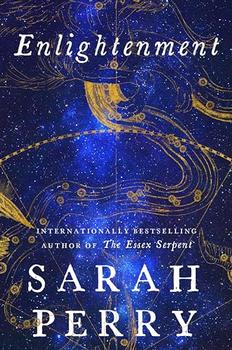Book Club Discussion Questions
In a book club? Subscribe to our Book Club Newsletter!
Please be aware that this discussion guide will contain spoilers!
- Enlightenment contains many visual elements, for example, the recurring images of the cosmos and the rich descriptions of changing weather in Adleigh. What are some of the dominant symbols in this book and how do they interact with or influence the book's themes?
-
When Grace returns to Adleigh in the book's middle section, she grapples with simultaneous fear and excitement as she prepares to see her ailing Aunt. Perry writes: "'You can't expect to only feel one thing at a time,' said Thomas, 'though certainly it would be convenient.'" Enlightenment illustrates many pairs of contradicting emotions and the kinds of life events that provoke them. Which other emotional dualities stood out to you, and how do the different characters process them?
-
In one of his columns, Thomas quotes a poem by W. H. Auden which reads: "If equal affection cannot be / Let the more loving one be me." Do you agree with this quote, or would you rather be the recipient of unrequited love? What are the benefits and difficulties of being on either side of this dynamic?
-
Grace Macaulay has many parental figures in her life despite the loss of her mother – Ronald Macaulay, Anne Macaulay, and Thomas Hart. How do each of these characters approach childrearing differently? How do their relationships to parenthood change or not change over the course of the novel?
-
Perry references London frequently throughout the book – Grace and Thomas both, in different eras of their lives, spend a lot of time there. What do you think they are escaping and pursuing when they leave their tiny community and migrate to a much larger city? What type of town do you prefer?
-
How does Enlightenment depict class differences in Essex? Does it affect the relationships between any characters? Does it feel different or similar to the area where you grew up?
-
In Thomas' last note to James, he writes: "To give love without receiving it is to understand we are made in the image of God – because the love of God is immense and indiscriminate and can never be returned to the same degree." If God's love can never be returned, what does it mean to attempt to make a deal with God, as Grace does during the fire?
-
Many of the characters' names contain possible double meanings – Bower, for example, references a pleasant shady spot usually underneath a tree. Dimi, for another, translates to "half" in his native Romanian. What are possible interpretations of other names in this novel, and how do they relate to or contradict the personalities to which they are assigned?
Unless otherwise stated, this discussion guide is reprinted with the permission of Mariner Books.
Any page references refer to a USA edition of the book, usually the trade paperback version, and may vary in other editions.




